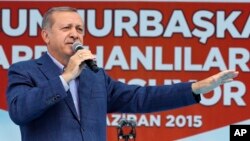The bid by Turkey’s president, Recep Tayyip Erdogan, to extend his powers by turning the government into an executive presidency received a major blow in this month's elections. But he insists he retains a powerful mandate, a claim rejected by opposition parties.
Erdogan campaigned hard for his AK Party to secure a supermajority to allow it to change Turkey from a parliamentary system to an executive presidency. The voters rejected that call, with the AK Party losing its parliamentary majority.
Semih Idiz, diplomatic columnist for Turkey’s Cumhurriyet newspaper and Al Monitor website, said the election had forced the president to change plans.
"For Erdogan, it means one thing — that his plans to become the sole leader of Turkey under guise of a presidential system, for all intents and purposes, may be at an end now, and he will be bound by the constitutional limits of his office," Idiz said. "The only way he can go from now is to become an impartial president, who acts presidentially rather than a leader of a political party or ideological movement."
Under the constitution, the president is bound to sever all party political ties and be impartial. But Erdogan insists that because he is Turkey’s first head of state directly elected by the people, he has a far more powerful political mandate than his predecessors.
Judicial probes
Suleyman Sah University political scientist Cengiz Aktar said there are significant political reasons why the president will not step back and become impartial.
"This is a constitutional quagmire, quandary, and we do not know what will happen, I mean, but he cannot become an impartial president," Aktar said. "He wants to ensure that he and his entourage will not be tried for the allegations of 17, 25 December 2013. Therefore, he cannot be neutral, and he will do everything and anything ... to save his fate and future."
The allegations refer to judicial probes into high-level corruption by the AK government, then led by Erdogan. The investigations implicated family members of ministers and Erdogan’s family. The probes were shut down by the government, and those investigating were either fired and removed from their office with the AK Party claiming it was a judicial coup attempt. But opposition parties are calling for the investigations to be reopened.
Nationalist Action Party leader Devlet Bahceli wants the president’s son, Bilal, to be investigated as a condition for joining the AK Party in government.
Sinan Ulgen, a visiting scholar at the Carnegie Institute in Brussels, said such calls are an obstacle to forming a coalition government.
The AK Party "would find it more difficult to find a junior partner to set up a coalition in government because expectations from that junior partner, in terms of rule of law, fight against corruption and so on, may not prove to be acceptable to the AK Party," Ulgen said.
Lower profile
The opposition is also insisting that the president step back from intervening in day-to-day operations of the government, along with ending a newly created presidential fund. The size of the fund remains secret, but observers say it is believed to be considerable.
Ulgen said that whatever the nature of the next government is, the president’s creeping powers will be curtailed.
Erdogan "has been able to do that, essentially because the executive, which constitutionally has a much higher authority, allowed the presidency to occupy that space," Ulgen said. "In a different government setup, the president will never find that space."
But Erdogan will most likely view this as a battle for survival, fearing any weakening of his political power will only encourage his opponents to pursue him, his family and his supporters over corruption allegations.
AK Party leader Ahmet Davutoglu is calling for opposition parties to look forward and put aside past anger, but observers warn that is likely to be a hard sell.




